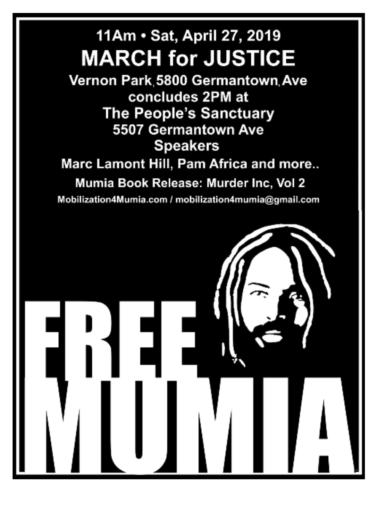Philly judge challenges “liberal” DA over Mumia’s appeal rights
In December, prison abolitionists and supporters of Mumia Abu-Jamal hailed Philadelphia County Court of Common Pleas Judge Leon Tucker’s ruling that granted new appellate rights to the internationally celebrated activist and author. Due to various suspicions about bias on the part of former State Supreme Court Justice Ronald Castille, Tucker ruled that Mumia should have the right to appeal his fraudulent conviction for the killing of police officer Daniel Faulkner.

Major march to Free Mumia set to take place in Philadelphia on April 27
After first revealing that staff had “discovered” several new boxes of evidence that had previously been concealed from both the courts and Mumia’s legal team, Philadelphia District Attorney Krasner’s office then challenged Tucker’s historic ruling.
Krasner, elected in 2017, was hailed at the time as a reformer. But his adamant attempts to cover up the frameup of the former Black Panther have now alienated him from some of his most progressive supporters. And he has also drawn the ire of Leon Tucker, a twice-elected Black judge.
Because the DA’s office appealed Tucker’s December decision, it is required to file a form 1925 with the Pennsylvania Supreme Court providing more detail to back up its appeal. Judge Tucker is then allowed to file his own form 1925 in response. Those most recent court filings in late March reveal an increasingly public rift between Tucker and Krasner about Abu-Jamal’s case.
Letters from Castille surfaced during the appeal and showed he was seeking aggressive sentencing for those convicted of police killings. They display “an unconstitutional appearance of bias and would lead a significant minority of the lay community to reasonably question Justice Castille’s impartiality,” Tucker wrote in his response to Krasner’s form 1925 filing. “Justice is being conformable, human, divine, fair, impartial, honest … no matter what. Not sometimes or most of the time, but at all times, be it at trial or on appeal. [Mumia’s] appeal has established by a preponderance of the evidence that … there was an unconstitutional potential for bias. [His] claims should be reviewed in the interest of justice.”
Krasner maintains the same position that the DA’s office has proffered for decades about Abu-Jamal’s case. His reasoning, in short: If we acknowledge any prosecutorial and judicial misconduct in Mumia’s case, many other wrongful convictions of lesser known cases will be challenged, too.
Abu-Jamal, who turns 65 this month, has been in prison since 1981.
Noelle Hanrahan, who broadcasts Mumia’s words worldwide through Prison Radio, recently wrote, “While Philadelphia DA Larry Krasner might not feel a sense of urgency, we need to. Mumia Abu-Jamal will be 65 years old in a few weeks. His eyesight has been severely compromised, making it hard for him to read, because he is suffering from as yet untreated cataracts and serious glaucoma. He is recovering from life-threatening complications of hepatitis C and diabetic shock caused by a reaction to treatment for debilitating skin rash conditions.” (prisonradio.org)
Mumia Abu-Jamal’s supporters held an event in Berkeley, Calif., April 6. Speakers included poet Alice Walker; activist, academic and author Angela Davis; and MOVE Minister of Confrontation Pam Africa, who also represented the International Concerned Family and Friends of Mumia Abu-Jamal.
Mumia supporters will march through Philadelphia’s Germantown neighborhood on April 27. A forum and book release at Uncle Bobbie’s community center will follow the march, marking the publication of the next volume of Mumia’s book, “Murder, Inc.,” about the long history of U.S. imperialism and colonial oppression. (For more information, see Mobilization4Mumia.com.)
The United States, which Mumia has long referred to as the “prison nation,” is in dire need of a robust prison abolitionist movement. The fight for Mumia’s freedom is a fight to free all political prisoners. Brick-by-brick, wall-by-wall, we will free Mumia — and free them all.

